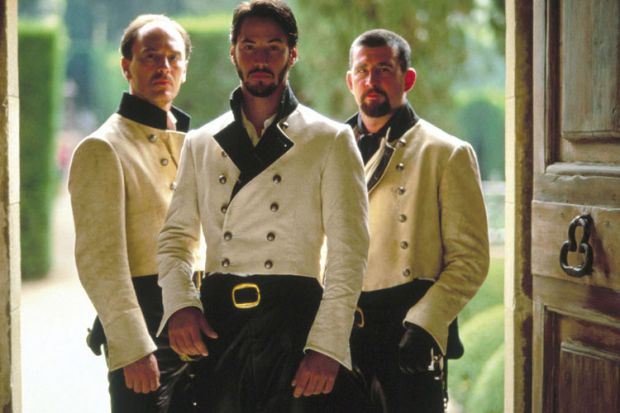Source: Sam Goldwyn/Renaissance Films/BBC/Kobal
Ado in academia: one of the journal’s editors claimed that the professor’s paper on Shakespeare was ‘unscholarly’
A major spat has broken out within the world of Shakespeare studies.
In January this year, the editors of the Italian journal Memoria di Shakespeare asked Richard Waugaman to revise his paper titled “The psychology of Shakespearean biography”, which they described as “absolutely pertinent” to a 2015 issue on Shakespeare’s biography.
A clinical professor of psychiatry and “faculty expert on Shakespeare” at Georgetown University in Washington DC, Professor Waugaman is also an “Oxfordian”, believing there is evidence that the poems and plays were written not by “the man from Stratford” but by Edward de Vere, Earl of Oxford.
His paper, he explains, examines this case but also explores “the conscious and unconscious psychological factors behind the taboo against openly discussing the authorship question”, citing examples from the history of science “where new discoveries that ultimately lead to paradigm shifts are often bitterly opposed by adherents of traditional theories”. All seemed to be proceeding to publication and the parties had reached the stage of discussing minor editorial details when, on 17 August, Professor Waugaman received an email from Rosy Colombo, senior professor of English at the Sapienza University of Rome.
The email, seen by Times Higher Education, explained that the previous editors of Memoria di Shakespeare had stepped down and that she and her new fellow editor, Gary Taylor – distinguished research professor at Florida State University – had “decided against publishing an article that has come out already”. Professor Waugaman responded that it seemed like “a breach of good faith with contributors” for “an article that was invited by a journal’s co-editors, be rejected by the next co-editors”.
This generated an almost immediate reply from Professor Taylor, saying that his agreement to take over as co-editor had been “conditional on rejection of certain contributions, like yours, which seem to me profoundly unscholarly, and which would have the effect of undermining the credibility and status of other contributions to the volume.
“I simply find your reasoning, and your evidence, as unconvincing as those of Holocaust deniers, and other conspiracy theorists,” he added.
Answering with biting sarcasm, Professor Waugaman noted that he could “only assume your emotions have over-ridden your common decency. I know one fellow Oxfordian who lost more than 70 relatives in the Holocaust, and he finds that comparison especially disgusting.”
Asked to comment on Professor Waugaman’s claims, Professor Colombo told THE that “it is not at all unusual for editors and publishers to reject something after it has been written, or even revised… Until you have a contract signed by both parties, it is entirely acceptable for the publisher/editor (of a book or a journal) to change their minds.”
Professor Taylor, meanwhile, reiterated his belief that “work like Waugaman’s is fundamentally unscholarly, irrational and illogical. I compared it to the work of Holocaust-deniers not because the damage to Shakespeare is comparable to the damage to the millions of people killed by the Nazis, but because Waugaman’s work depends upon the same kind of conspiratorial claims. You cannot reason with such claims, because they dismiss empirical evidence as just another conspiracy. The idea that anti-Stratfordian zealots are ‘censored’ is ridiculous.”





